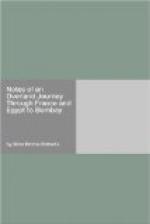The desert comes up to the very walls of Cairo, and these tombs rise from a plain of bare sand. I observed some gardens and cultivated places stretching out into the wilderness, no intermediate state occurring between the garden and the arid waste in which vegetation suddenly ceased. We might have performed the whole journey across the desert in the carriage which had brought us thus far, but as one of the ladies was a little nervous, and moreover thought the road too rough, I readily agreed to choose another mode of conveyance; in fact, I wished particularly to proceed leisurely to Suez, and in the manner in which travellers had hitherto been conveyed.
The mighty changes which are now effecting in Egypt, should nothing occur to check their progress, will soon render the track to India so completely beaten, and so deeply worn by wheels, that I felt anxious to take advantage of the opportunity now offered to traverse the desert in a more primitive way. I disliked the idea of hurrying through a scene replete with so many interesting recollections. I had commenced reading the Arabian Nights’ Entertainment at the age of five years; since which period, I had read them over and over again at every opportunity, finishing with the last published number of the translation by Mr. Lane. This study had given me a strong taste for every thing relating to the East, and Arabia especially. I trust that I am not less familiar with the writings of the Old and New Testament, and consequently it may easily be imagined that I should not find three days in the desert tedious, and that I felt anxious to enjoy to the uttermost the reveries which it could not fail to suggest.
In parting with our friend and the carriage, he declared that he would indemnify himself for the constraint we had placed upon him, by driving over two or three people at least. Fortunately, his desire of showing off was displayed too soon; we heard, and rejoiced at the tidings, that he upset the carriage before he got to the gate of Cairo. Two or three lives are lost, it is said, whenever the Pasha, who drives furiously, traverses the city in a European equipage. That he should not trouble himself about so mean a thing as the life or limb of a subject, may not be wonderful; but that he should permit Frank strangers to endanger both, seems unaccountable.
No Anglo-Indian resident in either of the three presidencies thinks of driving a wheel-carriage through streets never intended for such conveyances. In visiting Benares, Patna, or any other of the celebrated native cities of India, elephants, horses, palanquins, or some other vehicle adapted for the occasion, are chosen. It, therefore, appears to be the more extraordinary that English people, who are certainly living upon sufferance in Egypt, should thus recklessly expose the inhabitants to danger, to which they are not subjected by any of their own people under the rank of princes. Nothing can be more agreeable or safe than a drive across the desert, and probably the time is speedily approaching in which the rich inhabitants of Cairo will indulge, as they do at Alexandria, in the luxury of English carriages, and for this purpose, the streets and open spaces best adapted for driving will be improved and widened.




